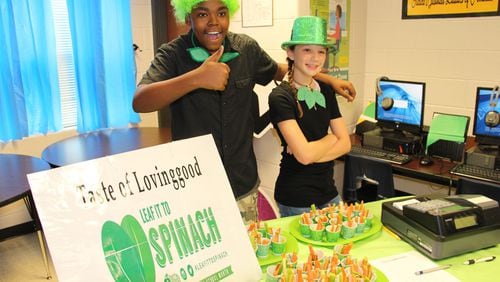It’s one thing to learn about healthy food choices or balancing a personal budget from a book or worksheet. It’s another to have hands-on experiences that bring the lessons to life. At Lovinggood Middle in west Cobb County, students have been applying classroom work to real-world situations through Connections, a program that has a team of teachers from Innovations and Inventions, Business and Technology, Family and Consumer Sciences and Visual Arts working together to create a cohesive, hands-on approach to learning.
“What’s unique to us is that we’ve developed professional learning communities by compiling interrelated activities from all our subject areas,” said Dawn Castleberry, an 11-year instructor who heads the family and consumer science section. “Students participate in each program for nine weeks and make real-world connections to the majority of their lessons.”
One of the program’s main focuses centers on the school’s garden that was established by a grant from Georgia Organics. Last spring, the students planted and harvested carrots, and this term, they’ve been bringing in herbs and cultivating a fall crop of spinach and winter vegetables. The work is supported by Robotics Club that made tools from a 3D printer, and art students who designed and put up scarecrows. Innovations students used a hydroponic growth chamber to test soil content and monitor plant growth. The results of their labor are sold in a ‘store’ where students can use their practice checkbooks to pay for items.
“Kids love that the process gives them an idea of all the careers that connect to growing something: producing farm-to-table items, running a business, making payments and managing a checking account,” said Castleberry. “It’s one team effort. We’re not just teaching a lesson anymore. We’re applying it, and that’s what makes it fun.”
The garden has grown to be a focal point for the 1,460-student school, drawing support from other classes and the administration as well.
“It’s got everybody working side by side,” she said. “Our autism class waters and weeds. The front office gives shredded paper for the compost. Our special education class got the hoses donated. It’s become one common goal.”
Business teacher Pshantal Dean-McGruder jumped at the chance to involve her students in the garden project.
“This is my 20th year teaching business ed, and I’ve had to come up with many ways to teach business skills and the principles and processes in a way that impacts students,” she said. “It’s more than just researching a career. Farm-to-table is a big push in agriculture now that lent itself to our curriculum.”
The school store adds to her student’s financial literacy lessons. “We’ve had parents come in and act as the store owners,” she said. “The students learn how to manage money on a budget so they can buy food items, little games and toys we’ve had donated. It’s a real eye-opener.”
By connecting the courses behind a common project, teachers are also providing another valuable lesson, said Dean-McGruder. “There are benefits to the students who see how we collaborate. It’s more than an idea — the adults are doing it, too.”






